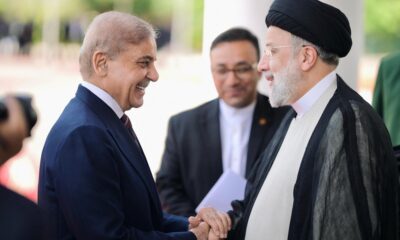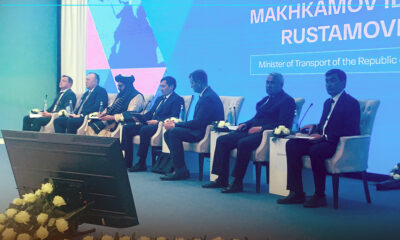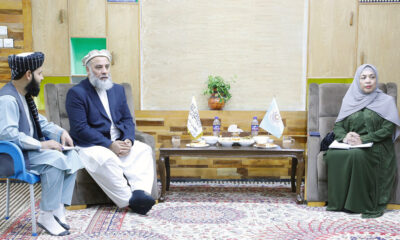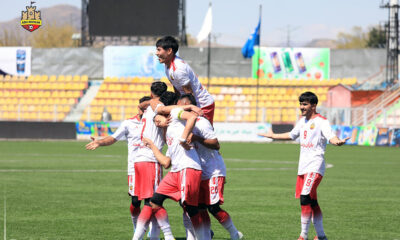Latest News
Petraeus downbeat about Afghanistan’s future post pullout
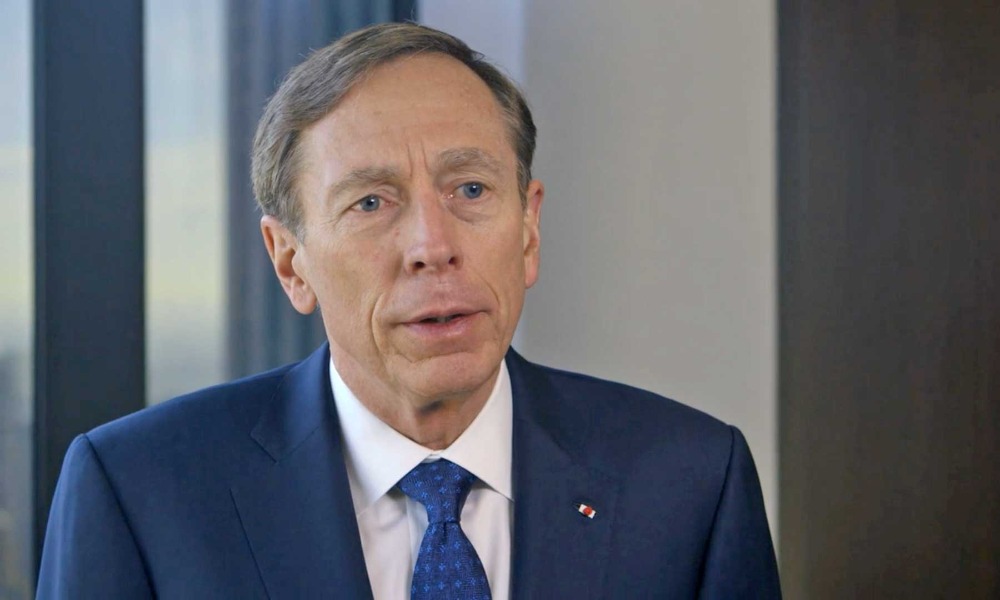
General David H. Petraeus, retired US Army general and former director of the CIA said on Saturday he fears the United States will come to regret their decision to withdraw all troops and warned of a possible civil war.
In an interview with VOA, Petraeus said despite measures being taken to mitigate risks by extremists from re-establishing safe havens in Afghanistan, he fears “that we will come to regret this because there could very well be the return of a sense of civil war, a reality of civil war.”
He said he sees “no willingness” on the Taliban’s part to commit to meaningful, verifiable and sustainable agreements “that would be necessary to enable some kind of sharing of power; some kind of again, diplomatic resolution of the issues and instead I see a Taliban who has gotten everything that they wanted from the negotiations.”
He stated the Taliban has gotten its leaders and fighters out of prison, under the Doha agreement signed between the United States and the Taliban in February last year.
“Now they are getting the U.S. to leave which then also means that our coalition partners leave,” and the foreign contractors who do the maintenance on military helicopters and fixed-wing aircraft for the Afghan defense force will also leave, he said.
He said based on this alone, one will see an erosion of security and the people will “fall back on their tribe, their ethnic group, their sectarian affiliation, their political party”.
“You may see again the kind of civil war that characterized the situation in Afghanistan after the collapse of the post-Soviet regime in Kabul which took place two or three years after the departure of Soviet forces and when the Soviet funding eventually ran out.”
But he said he had enormous admiration for the Afghan security forces who he said were fighting and dying for their country and for a democratically elected government.
“They’re fighting for a country that is very different from the one that the Taliban will establish if they are able to regain control of the country.”
He stated that should this happen, the Taliban would return Afghanistan to a “theoretic medieval government structure”.
But he said he hopes his fears are misplaced and that “this does not come to pass”.
Petraeus said he was concerned that foreign contractors might feel that once troops have withdrawn that security will not be adequate enough for them to remain, adding that he does “not see any willingness” on the Taliban’s part to “negotiate in good faith”.
He said he is aware that U.S. military commanders and American intelligence officers among other are working hard to identify ways to mitigate the risks of al-Qaeda or ISIS (Daesh) or other extremist group from establishing sanctuaries in Afghanistan,
He questioned however whether the U.S. would in fact get a base in a neighboring country stating that Pakistan has refused the request and so has Uzbekistan.
He pointed out that any flights out of bases in the Gulf states is a long commute – particularly for drones which he said had been the “unblinking eyes that were able to establish over so many areas in Afghanistan to identify when you see what could be extremist activity and the establishment of sanctuaries and
perhaps training bases and ranges and a variety of other facilities that might be the hub.”
He also said that the U.S. had destroyed on a number of occasions over the past 20 years attempts by al-Qaeda to re-establish bases in eastern Afghanistan and “more recently one down in southern Afghanistan, in Helmand province.”
This Petraeus said was “a bit of a surprise”.
However, he blamed the Taliban, the Haqqani network and the Islamic Movement of Uzbekistan for providing the grounds for terrorist organizations to establish themselves in Afghanistan.
Petraeus said it is these groups that are “eroding the security posture of Afghanistan, who are creating ungoverned spaces or spaces governed by the Taliban such as they are, and it is a fact that Islamist extremists will exploit ungoverned spaces anywhere in the Muslim world and that certainly includes Afghanistan.
He also said the U.S. has a “moral obligation” to Afghans who worked alongside American soldiers on the battlefield as interpreters, as well as those who played other roles, and said these people “and in many cases that of their family members” should be granted visas to live in the U.S.
He said while this is a long process, various options are being examined including some kind of real airlift of these individuals – even to a third Country where they could be processed.
“There is a recognition very much on Capitol Hill, certainly at the State Department in the Pentagon and increasingly in the White House that there is this moral obligation that we need to take care of those who did risk their lives as a result of what they did together with our forces.”
He said he thinks there will be some solution that will be forthcoming. “I just hope it is developed quickly enough so that we don’t end up leaving many of them behind and not meeting that very important obligation that we have incurred.”
He said he hopes however that his worst fears are not realized and that his assessment is inaccurate and that the Afghan security forces continue to receive solid assistance from the U.S. and NATO allies, from diplomats and aid workers and other international organizations.
He also said he hopes the Afghan security forces show they can stand up to the Taliban on their own and that contractors stay on in Afghanistan to maintain the equipment and weapons systems.
Petraeus also stated he hopes the Taliban will eventually engage in “true negotiations” and be willing to compromise on some issues.
He said however he does not see “enormous leverage” for U.S. special envoy Zalmay Khalilzad’s continued diplomatic efforts “given that we have told the Taliban that we are leaving.”
Latest News
Iran, Pakistan leaders raise concerns over ‘terrorist groups’ in Afghanistan

Following a two-day official visit to Pakistan, Iranian President Ebrahim Raisi and Pakistan’s Prime Minister Shehbaz Sharif issued a joint statement emphasizing the need to further expand commercial and economic cooperation and transform the common border of the two countries from a “border of peace” to “border of prosperity”.
The two leaders also strongly condemned aggressions and crimes of Israel in Gaza, and demanded an immediate and unconditional ceasefire, as well as unimpeded humanitarian access to the besieged people of Gaza.
Numerous other issues were also discussed but on the topic of Afghanistan, they jointly declared their commitment to the development of Afghanistan as a peaceful, united, independent country free from the threats of terrorism and drug trafficking.
According to the statement the two countries pointed out that the existence of terrorist organizations in Afghanistan is a serious threat to the security of the region and the world.
The two sides stressed their desire to strengthen cooperation in the field of fighting terrorism and ensuring security and creating a united front against terrorism.
They also discussed the importance of coordinating regional and international efforts to ensure security and stability in the region.
“While respecting the sovereignty and territorial integrity of Afghanistan, the two sides recognized that increasing participation of all strata of Afghans in basic decision-making will lead to the strengthening of peace and stability in this country,” the statement read.
Latest News
Over 1,000 Afghan refugees forced out of Pakistan in one day

The Ministry of Refugees and Repatriations (MoRR) says over 1,000 Afghan migrants were forcibly returned from Pakistan on Tuesday through Spin Boldak border crossing in Kandahar province, the ministry said in a statement.
The ministry stated that based on information provided by the Spin Boldak Kandahar border command, these returnees comprised 191 families, totalling 998 people.
In addition, three migrants released from Pakistani prisons were also returned, according to the statement.
The statement added that after registering the returnees, the refugees were referred to the offices of the International Organization for Migration (IOM), the World Food Program (WFP) and the United Nations High Commissioner for Refugees (UNHCR).
Each family received 10,000 afghanis – paid to them by the Islamic Emirate.
In another statement, the ministry said that 2,783 migrants living in Iran voluntarily and forcibly returned to the country during this week.
Latest News
Afghanistan’s minister of transport and aviation attends regional meeting in Uzbekistan

Hamidullah Akhundzadeh, acting Minister of Transport and Aviation, headed a delegation to Uzbekistan for a ‘Six-Party Corridor’ meeting that included representatives from Afghanistan, Russia, Belarus, Pakistan, Kazakhstan and Uzbekistan.
On the sidelines of this meeting the Afghanistan delegation discussed trade through the corridor with the other five relevant countries.
According to the ministry of transport and aviation, Akhundzadeh met with the deputy ministers of transport of Russia and Belarus.
He also discussed ways to expand transit between Afghanistan and Russia; and Afghanistan and Belarus, and provide the necessary facilities to achieve this.
The ministry added that the acting minister had a bilateral meeting with the Minister of Transport and the Special Representative of the President of Uzbekistan on Afghanistan and discussed the expansion of road transport between the two countries.
-

 Sport5 days ago
Sport5 days agoAfghanistan Champions League kicks off with grand opening ceremony
-

 Latest News4 days ago
Latest News4 days agoPakistan’s frontiers minister stresses ‘dignified’ return of Afghan refugees
-

 Business5 days ago
Business5 days agoAfghanistan’s economic prospects are bleak: World Bank
-

 Latest News5 days ago
Latest News5 days agoMore than 800 Afghan refugees deported from Pakistan in two days
-

 Regional3 days ago
Regional3 days agoIranian president lands in Pakistan for three-day visit to mend ties
-

 Climate Change4 days ago
Climate Change4 days agoMassive river flooding expected in China, threatening millions
-

 Latest News4 days ago
Latest News4 days agoChinese keen to invest in Panjshir-Kabul water conduit project
-
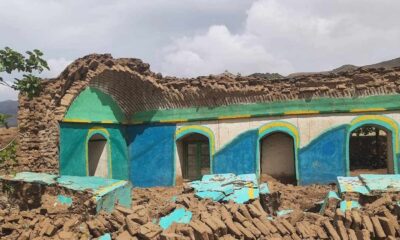
 Latest News5 days ago
Latest News5 days agoRoof collapse kills two in Helmand


